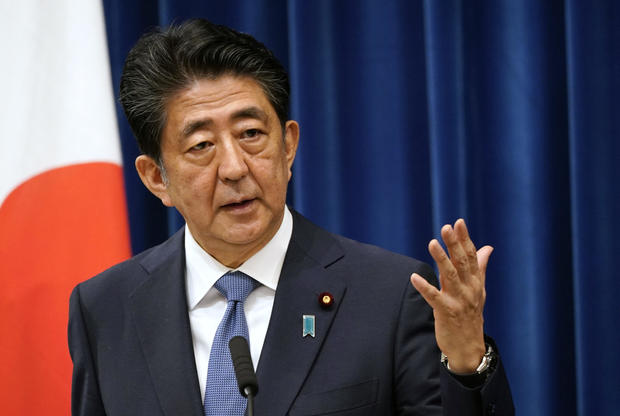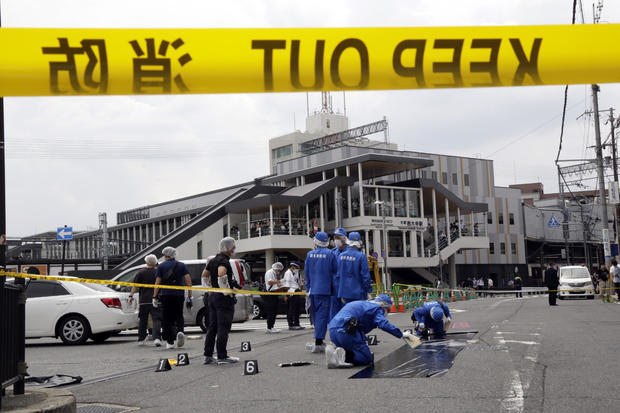Japan's former Prime Minister Shinzo Abe was shot as he gave a campaign speech Friday in western Japan and airlifted to a hospital, but the country's national public broadcaster NHK said later that he had succumbed to his injuries. Multiple Japanese and international news outlets cited officials from Abe's political party and the regional hospital where he was treated as confirming his death.
Local fire department official Makoto Morimoto said Abe was in cardiopulmonary arrest, or CPA, meaning he was not breathing and his heart had stopped, even as he was airlifted to the hospital.
Chief Cabinet Secretary Hirokazu Matsuno told reporters that police had arrested a male suspect at the scene of the attack.
"A barbaric act like this is absolutely unforgivable, no matter what the reasons are, and we condemn it strongly," Matsuno said.
Current Prime Minister Fumio Kishida, who belongs to the same political party as Abe, returned to Tokyo by helicopter from his own campaign destination of Yamagata, in northern Japan. He told reporters earlier that he was "not aware of the motives and background behind this attack, but this attack is an act of brutality that happened during the elections — the very foundation of our democracy — and is absolutely unforgivable."
NHK aired video of Abe collapsed on the street with several security guards running toward him. He was reportedly shot a few minutes after he started talking outside a train station in western Nara. In videos posted to social media at least two apparent gunshots can be heard as a man resembling Abe speaks, and a white plume of smoke is seen behind the former prime minister.
According to Japan's Kyodo news agency, Abe sustained gunshot wounds to his neck and chest.
NHK, quoting multiple military sources, said the suspect was employed for three years in Japan's Maritime Self-Defense Force, until 2005. The network described the weapon used in the attack as homemade. Police said the suspect had told them he was dissatisfied with Abe and wanted to kill him.
Other videos posted online show campaign officials surrounding Abe in an apparent attempt to treat the popular former leader, who was still influential in the governing Liberal Democratic Party and headed its largest faction, Seiwakai. Elections for Japan's upper house, the less powerful chamber of its parliament, are Sunday.
The attack was a shock in a country that's one of the world's safest and has some of the strictest gun control laws anywhere.
In a statement provided to CBS News, a White House spokesperson said the Biden administration was "shocked and saddened to hear about the violent attack against former Japanese Prime Minister Shinzo Abe" and added that officials were "closely monitoring the reports and keeping our thoughts with his family and the people of Japan."
During a visit to Indonesia, U.S. Secretary of State Antony Blinken told reporters the assassination of Abe was "profoundly disturbing."
Blinken said he had shared "the very deep condolences of the United States" with his Japanese counterpart during a meeting in Indonesia.
"This is shocking," said the top U.S. diplomat. "It's profoundly disturbing in and of itself. It's also such a strong personal loss for so many people. To the United States, Prime Minister Abe was an extraordinary partner and someone who was clearly a great leader."
He credited Abe for having brought U.S.-Japan relations "to new heights" during his time in office, and called him "a leader with great vision" and "the incredible ability to work toward that vision."
One of the first world leaders to express condolences after Abe's passing was India's premiere Narendra Modi, who called the slain Japanese politician one of his "dearest friends," and a "towering statesman."
Abe, 67, was Japan's longest-serving prime minister. He resigned in September 2020 due to health problems. Abe said at the time that he was suffering from a recurrence of the ulcerative colitis that brought an end to his first term in 2007. He told reporters it was "gut wrenching" to leave many of his goals unfinished and spoke of his failure to resolve the issue of Japanese abducted years ago by North Korea, a territorial dispute with Russia and a revision of Japan's war-renouncing constitution.
That last goal was a big reason he was such a divisive figure.
His ultra-nationalism riled the Koreas and China, and his push to normalize Japan's defense posture angered many Japanese. Abe failed to achieve his cherished goal of formally rewriting the U.S.-drafted pacifist constitution because of poor public support.
Supporters of Abe said that his legacy was a stronger U.S.-Japan relationship that was meant to bolster Japan's defense capability. But Abe made enemies too by forcing his defense goals and other contentious issues through parliament, despite strong public opposition.
Abe was a political blue blood who was groomed to follow in the footsteps of his grandfather, former Prime Minister Nobusuke Kishi. His political rhetoric often focused on making Japan a "normal" and "beautiful" nation with a stronger military and bigger role in international affairs.
World - Latest - Google News
July 08, 2022 at 06:05PM
https://ift.tt/jBK1RyT
Shinzo Abe, former Prime Minister of Japan, killed at age 67 in shooting attack as he delivered campaign speech - CBS News
World - Latest - Google News
https://ift.tt/pxCJS84
Bagikan Berita Ini
















0 Response to "Shinzo Abe, former Prime Minister of Japan, killed at age 67 in shooting attack as he delivered campaign speech - CBS News"
Post a Comment